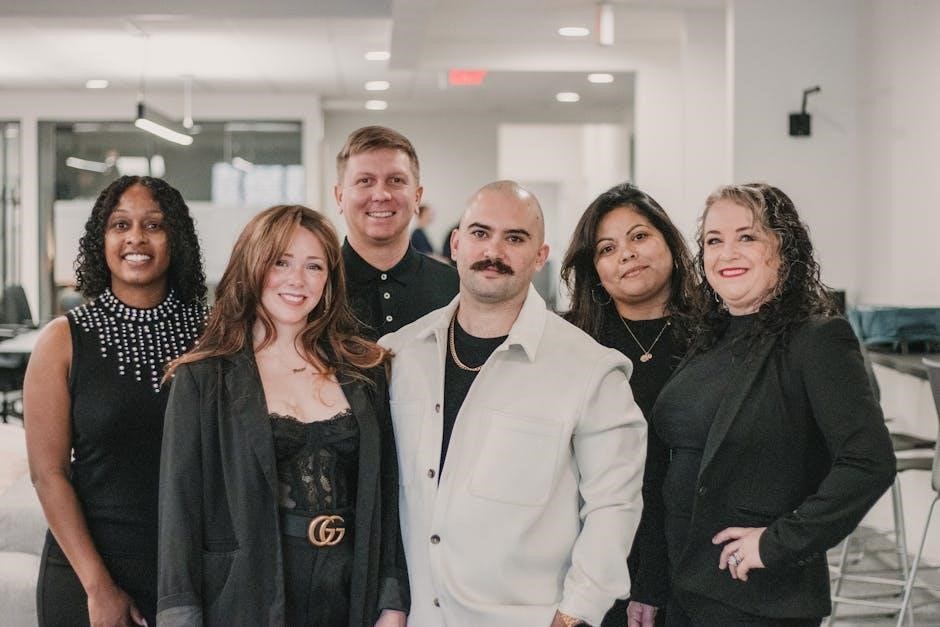never eat alone pdf
In Never Eat Alone, Keith Ferrazzi shares insights on the power of networking and building relationships to achieve professional success, offering practical strategies for lasting connections․
Overview of “Never Eat Alone”
Never Eat Alone by Keith Ferrazzi is a groundbreaking guide to professional networking, emphasizing the importance of relationships in achieving success․ Ferrazzi, a renowned expert, shares practical strategies for building and maintaining connections, advocating for generosity and vulnerability as key principles․ The book challenges traditional networking norms, encouraging readers to focus on meaningful interactions rather than superficial exchanges․ By blending personal anecdotes with actionable advice, Ferrazzi demonstrates how relationships can unlock opportunities and drive personal and professional growth․ Since its publication, Never Eat Alone has become a timeless resource, inspiring professionals to rethink their approach to networking and relationships in a competitive world․
The Importance of Networking in Professional Success
Networking is a cornerstone of professional success, enabling individuals to access opportunities, gain insights, and build trust․ Keith Ferrazzi highlights that meaningful connections can open doors to new possibilities, fostering collaboration and innovation․ Effective networking transcends mere socializing, focusing instead on creating value for others․ By nurturing relationships, professionals can establish a support system that enhances their career trajectory․ In today’s competitive landscape, a strong network serves as a foundation for resilience and growth, demonstrating that success is often a result of who you know and how well you cultivate those relationships․ Networking, when done sincerely, becomes a powerful tool for achieving long-term professional goals․

Author Background
Keith Ferrazzi, renowned for his expertise in networking, became the youngest CMO at Deloitte Consulting and is a Yale graduate, establishing himself as a thought leader in professional relationships․
Who is Keith Ferrazzi?
Keith Ferrazzi is a distinguished author and business leader, best known for his New York Times bestselling book Never Eat Alone․ He is recognized as a master of networking and relationship-building, having held prominent roles such as the youngest Chief Marketing Officer at Deloitte Consulting․ Ferrazzi’s philosophy emphasizes the importance of genuine connections and generosity in achieving professional success․ His work has resonated widely, making him a prominent thought leader in the fields of business and personal development․ His insights have been shared through various platforms, including speaking engagements and media appearances, solidifying his reputation as an expert in networking strategies․
Keith Ferrazzi’s Career Highlights
Keith Ferrazzi’s career is marked by exceptional achievements, beginning as the youngest Chief Marketing Officer at Deloitte Consulting․ His leadership and strategic insights drove significant business growth․ Ferrazzi later founded Ferrazzi Greenlight, a consulting firm focused on leadership development and organizational transformation․ His book, Never Eat Alone, became a bestseller, solidifying his reputation as a networking expert․ He has also contributed to various media outlets and spoken at major events, further cementing his influence in the business world․ Ferrazzi’s success stems from his ability to blend innovative strategies with a deep understanding of human relationships, making him a respected figure in professional development․
The Inspiration Behind “Never Eat Alone”
Keith Ferrazzi’s inspiration for Never Eat Alone stemmed from his belief in the transformative power of relationships․ Drawing from his own journey, Ferrazzi aimed to empower professionals by sharing strategies for building meaningful connections․ He emphasizes that success is not just about individual talent but about cultivating a network of supportive relationships․ Ferrazzi’s philosophy is rooted in generosity, vulnerability, and the idea that relationships, when nurtured, can unlock opportunities and drive personal and professional growth․ The book reflects his passion for helping others achieve their goals through intentional networking, making it a guide for those seeking to build lasting connections in their careers and lives․
Key Concepts from the Book
Never Eat Alone emphasizes building genuine relationships, leveraging generosity, and embracing vulnerability to foster professional success․ Ferrazzi highlights the importance of collaboration over competition and creating value for others․
The Power of Relationships in Business
Never Eat Alone underscores the transformative power of relationships in business, emphasizing that success is deeply rooted in genuine, mutually beneficial connections․ Keith Ferrazzi argues that relationships are not just tools for advancement but the very foundation of professional achievement․ By fostering trust, collaboration, and empathy, individuals can create networks that open doors to opportunities, provide support during challenges, and drive innovation․ Ferrazzi illustrates how relationships built on authenticity and generosity can lead to long-term success, while transactional approaches often fall short․ He encourages readers to view relationships as investments in people, rather than mere stepping stones, highlighting the profound impact of meaningful connections in achieving both personal and professional goals․
Why You Should Never Eat Alone
Keith Ferrazzi’s philosophy, as outlined in Never Eat Alone, revolves around the idea that every interaction is an opportunity to build meaningful connections․ Eating alone is a missed chance to foster relationships, share ideas, and create value for others․ Ferrazzi argues that meals, whether breakfast, lunch, or dinner, are prime moments to connect with people who can enrich your personal and professional life․ By prioritizing generosity and reaching out to others, individuals can transform everyday interactions into meaningful opportunities for growth․ This approach not only strengthens networks but also cultivates a mindset of collaboration and mutual support, leading to lasting success and fulfillment․ The philosophy encourages readers to view every meal as a chance to build bridges, not just satisfy hunger․
Generosity as a Networking Strategy
In Never Eat Alone, Keith Ferrazzi emphasizes that generosity is the cornerstone of effective networking․ By focusing on giving rather than taking, individuals build trust and strengthen relationships․ Ferrazzi suggests that offering help, sharing knowledge, or making meaningful introductions creates a foundation for mutual support․ Generosity fosters collaboration and reciprocity, leading to deeper connections․ This approach shifts networking from transactional exchanges to meaningful, long-term partnerships․ Ferrazzi illustrates how small acts of kindness can cultivate a network of loyal allies․ By prioritizing others’ success, individuals not only enrich their own lives but also create a ripple effect of goodwill․ This philosophy transforms networking into a powerful tool for personal and professional growth․ Generosity, Ferrazzi argues, is the key to unlocking lasting success and fulfillment․
The Role of Vulnerability in Building Connections
Vulnerability plays a crucial role in building authentic connections, as highlighted in Never Eat Alone․ Keith Ferrazzi argues that being open and genuine fosters trust and empathy, essential for deep relationships․ By sharing personal stories and challenges, individuals create a safe space for others to reciprocate, strengthening bonds․ Vulnerability breaks down barriers, allowing for more meaningful interactions․ Ferrazzi emphasizes that true connection requires courage to be authentic, which often leads to stronger professional and personal relationships․ This approach contrasts with superficial networking, promoting instead a culture of honesty and mutual support․ Embracing vulnerability, as Ferrazzi suggests, is key to forming connections that transcend mere transactions, leading to lasting success and fulfillment․

Networking Strategies
In Never Eat Alone, Keith Ferrazzi emphasizes proactive networking through generosity, reaching out, and creating value․ His strategies focus on building genuine relationships rather than attending events, leading to a loyal professional network that drives success․
How to Build a Strong Professional Network
In Never Eat Alone, Keith Ferrazzi outlines that building a strong professional network begins with genuine relationships․ He emphasizes the importance of being proactive and generous, suggesting that reaching out and creating value for others fosters trust and reciprocity․ Ferrazzi advises against traditional networking events, instead advocating for meaningful one-on-one connections․ He stresses the need to listen actively and show empathy, which helps in building rapport․ By focusing on collaboration over competition and nurturing long-term relationships, individuals can create a loyal and supportive network that enhances both personal and professional growth․ The key is to approach networking with patience and sincerity․
The Art of Reaching Out
Keith Ferrazzi highlights the importance of the art of reaching out in Never Eat Alone, emphasizing that genuine connections are built through proactive communication․ He suggests starting with personal, handwritten notes or thoughtful emails to stand out․ Ferrazzi advises being clear about your intentions while showing genuine interest in others․ He recommends avoiding self-centered approaches, instead focusing on how you can provide value․ Following up consistently is crucial, as it demonstrates reliability and commitment․ By mastering the art of reaching out, individuals can create opportunities, strengthen relationships, and build a robust professional network that fosters mutual success and growth․
Mastering the Follow-Up
In Never Eat Alone, Keith Ferrazzi underscores the critical role of mastering the follow-up in building enduring professional relationships․ He advocates for consistent and thoughtful communication after initial meetings, ensuring promises are kept and opportunities are nurtured․ Ferrazzi suggests sending personalized emails, handwritten notes, or even LinkedIn messages to maintain connection․ Timing is essential—follow-ups should be timely but not overly frequent, respecting the other person’s time․ Effective follow-up demonstrates reliability and genuine interest, fostering trust and deepening relationships․ By prioritizing follow-up, individuals can transform casual encounters into meaningful, long-term connections, ultimately strengthening their professional network and unlocking new opportunities for collaboration and growth․ This practice is vital for sustaining and expanding a robust network․
Creating Value for Others
Keith Ferrazzi emphasizes the importance of creating value for others as a cornerstone of effective networking in Never Eat Alone․ He suggests that offering help, sharing insights, or connecting people can foster mutual benefit and strengthen relationships․ By focusing on what you can give rather than what you can gain, you build trust and rapport․ This approach not only enhances your reputation but also encourages others to reciprocate, leading to a network of supportive and collaborative individuals․ Ferrazzi encourages readers to be proactive in identifying ways to add value, whether through mentorship, resource sharing, or simply being a sounding board․ This mindset shifts networking from transactional to transformative, benefiting both parties and creating lasting connections․

Social Skills for Networking
Social skills are vital for effective networking, as highlighted in Never Eat Alone․ Ferrazzi emphasizes the importance of effective communication, active listening, and empathy in building genuine connections․ These skills help individuals navigate social situations with confidence, fostering meaningful relationships and professional success․ By mastering these abilities, one can create a strong foundation for networking, ensuring interactions are both productive and memorable․ Ferrazzi’s insights underscore the transformative power of social skills in achieving personal and career goals․ His approach encourages authenticity and mutual respect, making networking a natural and enjoyable process․
Effective Communication in Networking
Effective communication is a cornerstone of successful networking, as emphasized in Never Eat Alone․ Keith Ferrazzi stresses that clear and concise dialogue fosters trust and understanding․ Active listening, paired with empathy, allows individuals to connect deeply with others, making interactions meaningful․ Ferrazzi suggests that communication should be a two-way exchange, focusing on the other person’s needs and interests․ By asking open-ended questions and showing genuine curiosity, one can build rapport and establish lasting relationships․ Effective communication also involves adaptability, tailoring your approach to diverse personalities and contexts․ Mastering this skill ensures that networking efforts yield fruitful outcomes, both personally and professionally․
Active Listening and Empathy
Never Eat Alone highlights the importance of active listening and empathy in building strong connections․ Keith Ferrazzi emphasizes that truly hearing others is key to fostering trust and rapport․ By focusing intently on what others say, without interrupting or preparing your response, you demonstrate value and respect․ Empathy allows you to understand their perspectives, which deepens relationships․ Ferrazzi suggests that showing genuine interest in others’ stories and challenges creates a foundation for mutual support․ This approach not only strengthens professional networks but also leads to more fulfilling personal connections, making networking a meaningful rather than transactional experience․ Effective listening and empathy are essential for long-term success in any relationship-driven endeavor․
Building Rapport with People
Never Eat Alone emphasizes that building rapport is a cornerstone of successful networking․ Keith Ferrazzi stresses the importance of finding common ground to establish trust and connection․ He suggests engaging in meaningful conversations that go beyond surface-level small talk by sharing personal stories and showing genuine curiosity about others․ Authenticity plays a crucial role in creating rapport, as people are more likely to connect with someone who is sincere․ Ferrazzi also highlights the value of mirroring others’ communication styles to create a sense of harmony․ By fostering a sense of mutual understanding and respect, individuals can build lasting relationships that transcend mere professional interactions, leading to stronger networks and greater opportunities․ These strategies ensure that connections are both meaningful and enduring․
Overcoming Shyness and Social Anxiety
Never Eat Alone addresses the challenges of shyness and social anxiety in networking․ Keith Ferrazzi acknowledges that these feelings are natural but emphasizes their surmountability․ He advises shifting focus from self-consciousness to genuinely helping others, which reduces anxiety and fosters meaningful connections․ Ferrazzi suggests starting small, engaging in low-stakes interactions to build confidence gradually․ Practicing active listening and asking open-ended questions can also alleviate nervousness by redirecting attention to others․ Additionally, reframing networking as an opportunity to serve rather than to gain can make interactions feel more authentic and less intimidating․ By embracing vulnerability and taking consistent action, individuals can overcome their fears and develop a robust professional network․ This mindset transformation is key to Ferrazzi’s approach to successful networking․
Business Relationships
Never Eat Alone highlights the importance of trust, collaboration, and nurturing long-term connections in professional success, emphasizing relationships as the cornerstone of business growth and opportunities․
Trust as the Foundation of Business Relationships
In Never Eat Alone, Keith Ferrazzi emphasizes that trust is the bedrock of successful business relationships․ Building trust requires authenticity, reliability, and consistent follow-through․ Ferrazzi suggests that professionals should prioritize transparency in their interactions, ensuring that their actions align with their words․ By fostering an environment of mutual respect and honesty, individuals can create strong, enduring connections․ Trust not only facilitates collaboration but also opens doors to new opportunities․ Ferrazzi argues that without trust, even the most promising relationships can falter, making it essential to cultivate and maintain trust in all professional interactions․ This foundation is critical for long-term success․

Collaboration vs․ Competition
In Never Eat Alone, Keith Ferrazzi advocates for collaboration over competition, emphasizing that mutual success often outweighs individual gains․ He argues that fostering partnerships and sharing opportunities creates a win-win scenario, driving innovation and growth․ Competition, while motivating, can isolate individuals, whereas collaboration builds stronger, more resilient networks․ Ferrazzi encourages professionals to adopt a mindset of abundance, believing there’s enough success for everyone․ By working together, people can achieve far more than they could alone․ This approach not only enhances personal relationships but also leads to broader professional achievements, making collaboration a cornerstone of lasting success in business and beyond․ Ferrazzi’s philosophy challenges traditional competitive norms, promoting a culture of shared goals and collective advancement․
Nurturing Long-Term Relationships
Nurturing long-term relationships is a cornerstone of Keith Ferrazzi’s philosophy in Never Eat Alone․ He emphasizes the importance of consistency, empathy, and generosity in maintaining connections․ Regular follow-ups, offering value, and being reliable are essential to building trust and loyalty․ Ferrazzi advocates for staying in touch through small gestures, such as sending articles of interest or celebrating milestones, to keep relationships alive․ Long-term relationships are not just about professional gain but also about fostering genuine friendships․ By prioritizing others’ needs and staying invested in their success, individuals create a network that provides support and opportunities for years to come․ This approach ensures relationships grow stronger over time, benefiting both parties involved․
The Role of Mentorship
Mentorship plays a vital role in professional growth, as highlighted in Never Eat Alone․ Keith Ferrazzi underscores the value of seeking guidance from experienced individuals who can offer wisdom and open doors to new opportunities․ Mentors provide perspective, advice, and support, helping mentees navigate challenges and make informed decisions․ Ferrazzi encourages building mutually beneficial relationships where mentors gain fresh insights and mentees gain invaluable experience․ Effective mentorship fosters a culture of learning and collaboration, leading to long-term success․ By investing time in nurturing these relationships, individuals create a network that not only supports their career but also enriches their personal development․ Mentorship is a cornerstone of lasting professional relationships․
Modern Networking
In Never Eat Alone, Keith Ferrazzi explores how digital tools and social media have transformed networking, emphasizing the importance of authenticity and strategic engagement in the virtual space․
Networking in the Digital Age
In the updated edition of Never Eat Alone, Keith Ferrazzi addresses the evolution of networking in the digital age, emphasizing the role of social media and online platforms in building relationships․ Ferrazzi highlights how tools like LinkedIn and Twitter can expand one’s network exponentially, enabling connections that transcend geographical boundaries․ However, he stresses that authenticity and personal touch remain paramount, even in virtual interactions․ The book provides practical advice on leveraging technology to enhance networking efforts, such as engaging in online communities and using digital tools to stay connected․ Ferrazzi also underscores the importance of balancing online activity with face-to-face interactions to foster deeper, more meaningful relationships․ By adapting traditional networking principles to the digital world, Ferrazzi offers a modern roadmap for professional success․
Using Social Media for Networking
In Never Eat Alone, Keith Ferrazzi explores how social media can be a powerful tool for networking, enabling professionals to connect with a global audience․ He emphasizes the importance of authenticity and consistency in online interactions, advising readers to share valuable content and engage genuinely with others․ Ferrazzi suggests leveraging platforms like LinkedIn to build personal brands and join relevant groups, while using Twitter to participate in meaningful conversations․ He also highlights the need to balance online activity with offline follow-up, ensuring that digital connections translate into real-world relationships․ By integrating social media into a broader networking strategy, professionals can amplify their reach and opportunities for collaboration and growth․
Virtual Networking Best Practices
Keith Ferrazzi’s Never Eat Alone outlines essential strategies for virtual networking, emphasizing preparation and engagement․ He recommends researching participants beforehand to tailor conversations and build rapport․ Ferrazzi suggests using video calls to maintain visual connections, ensuring a professional backdrop, and minimizing distractions․ Actively listening and asking open-ended questions can foster deeper interactions․ Following up with personalized messages after virtual meetings is crucial to solidify relationships․ Ferrazzi also advises leveraging virtual events and webinars to expand networks, encouraging consistent participation in online communities․ By applying these best practices, professionals can effectively build and nurture relationships in a digital landscape, ultimately driving career growth and opportunities․ Consistency and genuine interest are key to making virtual networking impactful and meaningful․
Leveraging Technology for Relationship Building
Keith Ferrazzi highlights the importance of technology in modern networking within Never Eat Alone․ He emphasizes using digital tools like social media platforms and email to maintain consistent communication with contacts․ Ferrazzi suggests leveraging LinkedIn for professional outreach and engaging with content shared by others to foster connections․ Personalized messages and timely follow-ups can enhance relationships, while CRM tools help manage interactions effectively․ He also advocates for using video conferencing to bridge geographical gaps, ensuring face-to-face interactions remain a priority․ By strategically integrating technology into networking efforts, professionals can build and sustain robust relationships, ultimately driving personal and professional success in today’s digital age․ Balancing technology with genuine human connection is essential for meaningful relationship building․
Never Eat Alone leaves a lasting impact by reshaping networking strategies, emphasizing the value of genuine relationships, and offering practical advice for professional and personal success․
The Lasting Impact of “Never Eat Alone”
Never Eat Alone has profoundly influenced professional networking, transforming how people view relationships as vital tools for success․ Its principles, such as prioritizing generosity and genuine connections, have reshaped modern networking strategies․ Since its 2005 release, the book has remained a cornerstone of career development, inspiring millions to rethink their approach to building professional relationships․ The expanded edition continues to resonate, offering timeless advice that aligns with the evolving digital landscape․ Ferrazzi’s insights have empowered individuals to foster meaningful connections, proving that networking is not just about self-advancement but about creating value for others․ Its enduring popularity underscores its relevance in today’s competitive world, making it a must-read for anyone seeking to elevate their professional and personal relationships․
Applying the Book’s Lessons in Real Life
Readers of Never Eat Alone can implement Ferrazzi’s strategies by prioritizing authenticity and generosity in their interactions․ By focusing on helping others and building trust, individuals can create robust professional networks․ Practicing active listening and empathy fosters deeper connections, while consistent follow-up ensures relationships remain strong․ Embracing vulnerability allows for genuine interactions, leading to mutual growth․ Integrating these principles into daily life transforms networking from a transactional activity into a meaningful journey of collaboration and support․ Ferrazzi’s approach encourages readers to view every encounter as an opportunity to add value, fostering long-term success and fulfillment in both personal and professional spheres․
The Future of Networking and Relationships
The future of networking lies in blending technology with authentic human connections․ As digital platforms evolve, virtual interactions will play a larger role, but the core principles of trust and generosity remain vital․ Ferrazzi emphasizes that true networking is about mutual support and collaboration, not just transactions․ By leveraging technology to maintain and expand relationships, professionals can build stronger, more resilient networks․ The key will be balancing efficiency with empathy, ensuring that digital tools enhance, rather than replace, meaningful interactions․ As networking continues to adapt, the focus will remain on nurturing relationships that foster growth and success for all parties involved․ Ferrazzi’s timeless wisdom ensures his principles will endure in this ever-changing landscape․











Leave a Comment